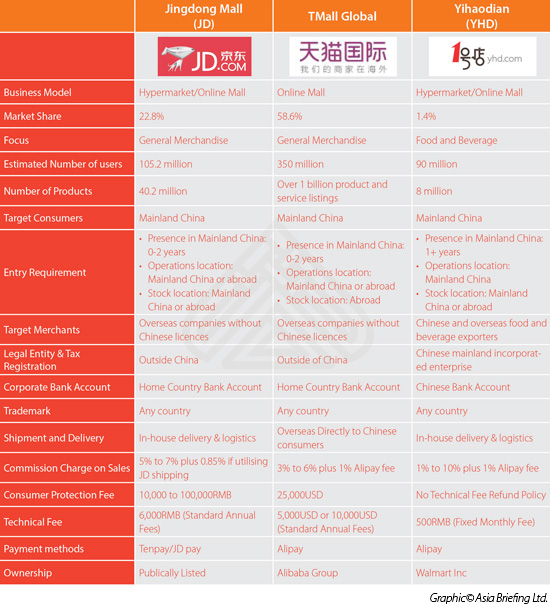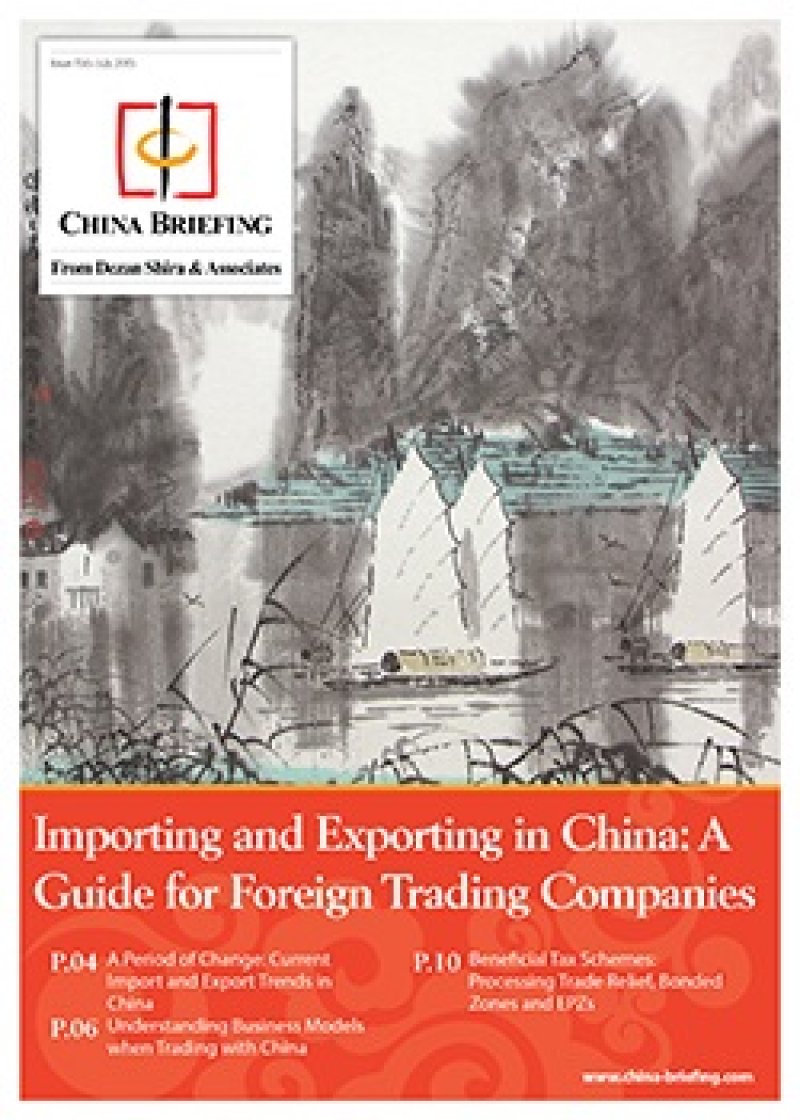Tmall, Yihaodian and JD: A Comparison of China’s Top E-Commerce Platforms for Foreign Enterprises
By Dezan Shira & Associates
Editor: Grace Tate
China is home to the world’s largest e-commerce market. With over US$458 billion in sales in 2014 and global e-commerce sites controlling a market share of over 92 percent, foreign engagement with the Chinese online retail sector is at a premium. This article compares leading e-commerce platforms Tmall Global, JD and Yihaodian to see how they rate for foreign merchants looking to sell to China’s lucrative market.
Tmall Global
Tmall is China’s largest online marketplace dedicated to domestic and international branded merchandise. Owned by Alibaba Group, Tmall provides a marketplace for foreign brands to open exclusive shopfronts. Tmall Global, launched in 2013, sells only imported goods, and allows international brands without a physical presence in China to sell directly to Chinese consumers.
However, Tmall Global now operates via an invitation-only policy where only qualified merchants are either invited to join or can apply through a certified third party agency (TP). Consequently, the necessity of TP cooperation has complicated the process of setting up a store on the Tmall Global platform. For foreign companies looking to establish an online store without a physical presence, JD Worldwide is an increasingly more attractive option.
![]() RELATED: IT-Based Solutions from Dezan Shira & Associates
RELATED: IT-Based Solutions from Dezan Shira & Associates
Eligibility requirements:
- A registered corporate entity outside of mainland China
- Possess retail and trade qualifications overseas
- Be the brand owner or authorized agency or possess the purchase voucher
- Possess the relevant stock certificate
Tmall Global targets:
- Corporations that have been operating for more than two years with annual sales over US$10 million;
- Branded B2C overseas businesses; and
- Brand owners or authorized agencies.
Selling point: Tmall Global provides merchants with an e-commerce platform and various marketing tools to help increase traffic and generate sales.
Warehouse: Tmall Global cooperates with certain FTZs in China to provide select merchants with a bonded warehouse service.
Logistics: Merchants must either ship packages directly from overseas, or store their products in a bonded warehouse in China for shipment to consumers. A Chinese address is mandatory to facilitate product return.
Cost:
- Security Deposit – US$25,000.
- Technical Fee – US$5,000 or US$10,000, per annum.
- Commission – 0.5 percent-5 percent plus 1 percent Alipay fee.
Suitable for: Large international brands with demonstrated potential to achieve a large volume of sales or high revenue.
Hypermarkets, such as JD and Yihaodian, allow independent merchants to list products or operate shopfronts. Online hypermarkets are vertically integrated, multi-category marketplaces that purchase directly from suppliers for sale through their own network. These hypermarkets operate a proprietary online e-commerce platform and an in-house logistics network offering same-day delivery.
Selling to a hypermarket is done via negotiation with a procurement manager. Exporters are not required to manage distribution or a shopfront, but must provide official marketing collateral to promote their products.

JD
JD is China’s largest online direct sales company. JD owns and operates seven fulfillment centers and 166 warehouses in 44 cities, with a further 4,142 delivery stations in 2,043 counties and districts across China. JD allows merchants to open individual shopfronts and is licensed to import food, beverage products, apparel and shoes directly from overseas. JD’s cross-border service, JD Worldwide, enables merchants to sell directly to Chinese consumers without a Chinese presence.
JD distinguishes itself from Tmall Global via active global promotion of JD Worldwide (particularly in the U.S. and Australia) and provision of a leading in-house logistics service. Furthermore, JD boasts a zero tolerance policy with regard to counterfeit products.
Entry Requirements
- Registered corporate identity outside mainland China, with registration capital of over RMB500,000;
- Possess retail and trade qualifications overseas;
- Be the brand owner or authorized agency or possess the purchase voucher; and
- Possess the relevant stock certificates.
JD promotes 3 modes of operation:
- Franchising Business Partner – This module allow merchants to set up store in JD and get facility to use JD warehouse to stock their products. JD takes the full responsibility providing warehousing, delivery and customer service.
- Licensing Business Partner – Merchants may set up store and complete packaging in order to ship the order. JD will supervise customer service and process invoice.
- Self Operation Partner – Merchants may sell on the JD platform, although warehousing and delivery must be handled by the merchants themselves
Selling point: JD provides both the e-commerce platform and comprehensive packages for logistic and warehouse services. JD’s net revenues for the second quarter of 2015 were US$7.4 billion, an increase of 61% year on year.
Warehouse: Merchants can use a warehouse service provided by JD through selected packages.
Logistics: Merchants can use a logistic service provided by JD through selected packages. JD’s 211 same-day and next-day delivery program covers 135 and 951 counties and districts, respectively.
Cost:
- Security Deposit – RMB10,000 – RMB50,000, depending on product category.
- Technical Fee – RMB6,000 per annum.
- Commission – 5-7 percent, plus 0.85 percent if the JD shipping service is used.
Suitable For: JD dominates the home, appliance and consumer electronics categories in China and therefore favours 3C products.
![]() RELATED: How to Open an Online Shop on Tmall Global
RELATED: How to Open an Online Shop on Tmall Global
Yihaodian (YHD)
Yihaodian is China’s largest online retailer of food and beverages, stocking over 8 million SKUs. The platform is 100 percent owned by U.S. retail giant Walmart and is licensed to import food and beverage products directly from overseas. In 2013, Yihaodian sold approximately 250 million imported items, including one-third of all imported UHT milk sold online in China. With a similar logistics system to JD, Yihaodian owns 7 warehouses and operates more than 200 distribution centers in 40 cities.
Yihaodian allows foreign enterprises to sell tax-free and to be exempt from China’s domestic product standards through ‘cross-border’ e-commerce. Enterprises are often free from VAT, license/permit and Chinese label requirements. The platform presents an exciting opportunity for fresh food and beverage exporters.
Entry Requirements
- Applicant must be a Chinese mainland-incorporated enterprise;
- Possess relevant tax registration certificate (either national tax or local tax);
- Current business license which passes annual inspection;
- Possess relevant trademark registration certificate or a notice of acceptance of application for trademark registration;
- Declaration of imported goods should be issued by China Customs within two years of application; and
- Inspection certificate issued by Entry-Exit Inspection and Quarantine Bureau within two years of application.
Feature Services: Yihaodian’s cross border e-commerce model enables foreign sales which are tax-free and exempt from China’s domestic product standards. This year Yihaodian set a Guinness World Record for selling 100 containers (2 million boxes) of imported milk in just 51.5 minutes.
Warehouse Service: Merchant must use a comprehensive warehouse service provided by Yihaodian.
Logistics: Merchant must use logistic service provided by Yihaodian.
Cost:
- Security Deposit – No Technical Fee Refund Policy
- Technical Fee – RMB500 per month.
- Commission – 1-10 percent plus 1 percent Alipay fee
Suitable For: Yihaodian specializes in the sale of fresh food and beverages.
Future Outlook for Foreign Enterprises
There are several distinguishing factors that separate TMall Global, JD and Yihaodian and can help inform which is the most suitable for a China business venture. Richard Cant, Director of Dezan Shira & Associates’ North America office, comments: “This comparison clearly reveals the increasingly bureaucratic nature of establishing a store on Tmall Global and highlights JD as an attractive alternative platform for foreign enterprises, complete with a logistics perk. While Yihaodian currently lacks a platform for foreigners without a presence in China, the site is well situated to claim a larger portion of China’s e-commerce market, owing to its unprecedented growth in the past five years and innovative use of augmented reality technology.”
Foreign investors looking to sell to China’s booming e-commerce market are invited to contact the IT service professionals at Dezan Shira & Associates for further assistance.
|
Asia Briefing Ltd. is a subsidiary of Dezan Shira & Associates. Dezan Shira is a specialist foreign direct investment practice, providing corporate establishment, business advisory, tax advisory and compliance, accounting, payroll, due diligence and financial review services to multinationals investing in China, Hong Kong, India, Vietnam, Singapore and the rest of ASEAN. For further information, please email china@dezshira.com or visit www.dezshira.com. Stay up to date with the latest business and investment trends in Asia by subscribing to our complimentary update service featuring news, commentary and regulatory insight. |
![]()
 An Introduction to Doing Business in China 2015
An Introduction to Doing Business in China 2015
Doing Business in China 2015 is designed to introduce the fundamentals of investing in China. Compiled by the professionals at Dezan Shira & Associates, this comprehensive guide is ideal not only for businesses looking to enter the Chinese market, but also for companies that already have a presence here and want to keep up-to-date with the most recent and relevant policy changes.
Importing and Exporting in China: a Guide for Trading Companies
In this issue of China Briefing, we discuss the latest import and export trends in China, and analyze the ways in which a foreign company in China can properly prepare for the import/export process. With import taxes and duties adding a significant cost burden, we explain how this system works in China, and highlight some of the tax incentives that the Chinese government has put in place to help stimulate trade.
 E-Commerce in China
E-Commerce in China
In this issue of China Briefing Magazine, we cover the current laws pertinent to the e-commerce industry in China, as well as introduce the steps involved in setting up an online shop in the country in order to help provide foreign investors with an overview of the e-commerce landscape in China.
- Previous Article China’s Silk Road Economic Belt – New Issue of China Briefing Magazine
- Next Article A Closer Look at China’s Free Trade Zones – Part II









